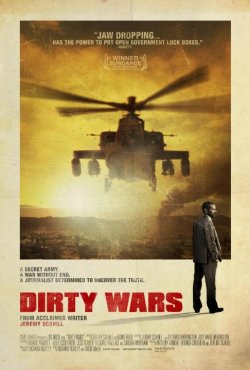- An argument against the United States’ War on Terror, Dirty Wars is always engaging, even if it is not balanced.
- Some viewers will consider Dirty Wars’ intellectual one-sidedness a flaw. Others, like me, will be less bothered by it.
- A bigger misstep is that much of the film’s content is already dated, and will be even more so in the months and years to come. Why? Because many news outlets have reported on United States drone strikes, raids on foreign civilians, and assassinations of US citizens. Dirty Wars is not as revelatory as it thinks it is.
- Nonetheless, the film has a convincing central theme: fighting violence with violence usually leads to more violence. Writer/Narrator/frequent on-screen personality Jeremy Scahill makes the point, in one form or another, time and again throughout Dirty Wars. And it is poignant each time.
- Scahill and Director Richard Rowley wisely structure their documentary around a single Special Forces attack in Gardez, one that proves equal parts horrifying and symptomatic of much larger problems. By frequently reminding us of the Gardez raid, Scahill and Rowley create emotional attachment.
- Unfortunately, many of their other decisions are less artful. Cutaways to reenactments, especially during the Gardez sequence, serve to dull the film’s message, not enhance it. Inarticulately placed music and awkward sound effects do the same. Why? Because such filmmakers’ tricks draw our attention, making us focus on the film’s mechanics, instead of on its content.
- Many of Rowley’s editing cuts have a similar effect. Each time the frame changes, we notice.
- Dirty Wars might have been more effective if Rowley had let establishing shots run through entire scenes and conversations.
- The filmmakers focus on Scahill’s journey, instead of on his interview subjects, a fact that also proves problematic. In addition to watching him supposedly conduct research, we see frequent reaction shots of Scahill as he listens to Iraqi, Afghani, Somali, Yemeni and other victims of United States military action, a decision that keeps our focus always on the journalist. Perhaps the intent is to help us grow as Scahill grows, but the problem is simple: the writer’s story is not the most emotionally disturbing one in this film. The victims’ stories are, so the audience would be more impacted if the victims had been Dirty Wars’ focus.
- Yet, despite all of their mistakes, Rowley and Scahill point out flaws in the War on Terror, their primary objective. Therefore, Dirty Wars at least partially succeeds.
- Final Grade: C-
-
Subscribe
Subscribed
Already have a WordPress.com account? Log in now.

Nice one. I haven’t actually heard of this but a C- doesn’t necessarily mean it wont’ be subject to my perusal someday. Sounds fairly interesting.
It is. And is plenty engaging. It’s just flawed.
The Academy obviously loves it.
This film started off strong but lost its punch by the end. I could not help but think “I really should be getting angry at what he is uncovering but the way he is presenting the information is not fueling my rage.” It is an important topic, I just wish it was told in a stronger fashion.
Agreed.
I would argue that it was so focused on Scahill that it lost sight of its content, which meant it didn’t evoke the sort of emotion it otherwise might have.
Good observation, that the audience “would be more impacted if the victims had been Dirty Wars’ focus.” You could be right, that it would have been more powerful with that approach
Thank you. As Courtney said in the above comments, I kept thinking I should be outraged by this movie. But I never was, if only because Scahill’s journey isn’t the most interesting one here.